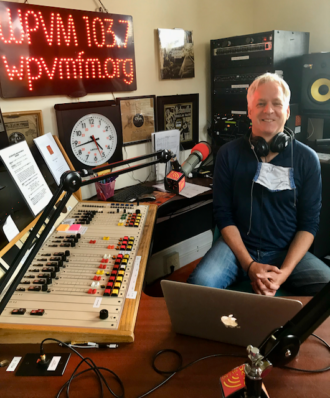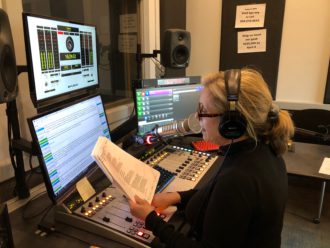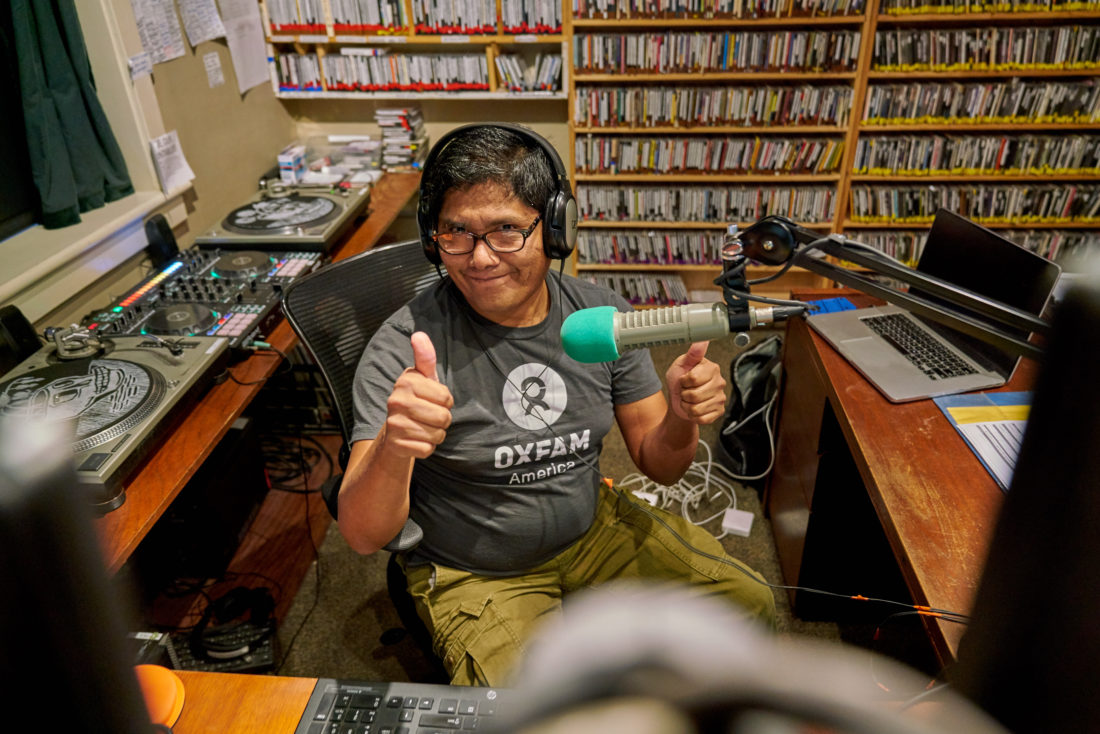Along with numerous corporate music and talk radio stations, Asheville is home to a healthy variety of nonprofit and community options on the FM dial.
Coinciding with the 101st anniversary on Nov. 2 of the first commercially licensed broadcast in the U.S., Xpress spoke with representatives from three local stations about the advantages and disadvantages of operating without commercial aid, as well as why radio remains a steady force in many people’s lives despite an ever-increasing number of news and entertainment options.
Community resource
For Asheville FM (103.3 FM) General Manager KP Whaley, one of the biggest perks of running a community radio station is across-the-board freedom. Not beholden to corporate sponsors or syndicated programming, the West Asheville-based enterprise can more fully represent its listener base — as well as pivot quickly in the face of drastic changes like the COVID-19 pandemic.
“We have nearly 100 volunteers producing programming and over 60 DJs, so we had to figure out how to keep those voices on the air while being safe,” Whaley says. “And I also really felt strongly that the station needed to be a live resource. I wanted the ability to go on the air and let people know what was happening.”
While the majority of Asheville FM DJs recorded shows from home, live programming remained in effect, and new shows were added to address the public’s needs as they arose. Whaley looped in a daily coronavirus update and began hosting an hourlong talk show about the pandemic and its wide-ranging effects, bringing in medical professionals, local business owners and other individuals impacted by the crisis. And the station doubled down on its commitment to music, recruiting sponsors to pay local bands to perform in venues across town and broadcasting the shows live.
“We also added a children’s story hour because the kids were not going to school and parents were having to stay home and watch the kids all day, so we sort of gave an hour break to parents — we like to think, anyway,” Whaley says with a chuckle.
The day-to-day flexibility has also made it easier for Asheville FM to stay true to its founding principles and reflect the city’s diversity through its programming and volunteers. Whaley notes that, while radio is usually a male-dominated medium, the station is proud to have female, people of color and queer voices heard throughout the week. He adds that the lineup of minority hosts has proved especially beneficial in recent years for providing more informed dialogue as the nation wrestles with political tumult and reckons with racial issues.
Though the advantages of independence are plentiful, Whaley admits that it also comes with the challenge of operating on a low budget. Yet despite the hardships of the pandemic, listeners have consistently come through on Asheville FM’s spring and fall fund drives, meeting the $30,000 goal each time and showing that the resource remains important to them.
“As long as cars have radio, it’s not going anywhere,” Whaley says. “We are that friend that people want to connect with. And as long as we keep our pulse on the community, then we’re being relevant.”
Remote control
Like Asheville FM, downtown-based WPVM (103.7 FM) went from having its volunteer DJs broadcast live from the studio to mostly remote programming. Davyne Dial, the station’s general manager and producer, calls the pandemic-prompted change “an interesting evolution,” but she quickly saw the benefits that a more flexible schedule afforded her collaborators.

“When you’re going in and doing the show live in the studio, you have a set time,” Dial says. “But the fact that people have options to record an interview changed how people are able to do radio.”
The shift encouraged WPVM’s hosts to expand their reach and interview people from around the U.S. and the world. Among the featured guests were musicians who were able to stay connected with their Asheville fan base, many of whom had plans to see the artists perform at area venues in 2020 until those gigs were canceled or postponed. But despite this variety, the station remained focused on the Asheville area and the needs of its residents during quarantine.
“We concentrate on local programming — local issues, local interviews, local music. So that was the advantage of listening to your radio: You still had that intimate connection with your community, but safely,” Dial says.
While the station’s overhead costs are relatively low, Dial points out that with much of WPVM’s listener base financially impacted by the pandemic — including many of Asheville’s service industry workers — donations to community radio became a luxury. In turn, the station saw a decline in smaller, $10-level donations, but the generosity of multiple patrons dedicated to keeping WPVM on the air ensured that broadcasts could continue.
However, she adds that the digital performance rights organization SoundExchange recently doubled its annual fee for nonprofit stations to $1,000, prompting many to drop their internet streaming and solely offer traditional radio. Citing an audience that’s spread out across the globe, Dial says it was important for WPVM to maintain an online option, and the decision paid off. She reports that listenership has gone up nearly a third during the pandemic — an encouraging sign considering WPVM’s near-unicorn status.
“There are a little over 2,000 low-power radio stations in the country at this time. Over 1,000 of those are owned by churches, and then approximately 150 by colleges and another 800 or so by the NAACP, Native American tribes and groups like that,” Dial says. “There are 60 stations like WPVM in the country that are not under the umbrella of a larger organization. So on the one hand, that means we have to be very frugal, but it also gives us a lot of freedom in the programming that we can do.”
Amplified service
Blue Ridge Public Radio (88.1 FM) has many of the same community-oriented goals as its local nonprofit peers. But as a National Public Radio affiliate, the stati

on’s downtown-based staff is able to pursue those aims with greater resources.
According to Membership Manager Erin Adams, listener support accounts for 55% of BPR’s total revenue, and the station’s development team recently wrapped up the 2021 fiscal year with increases of up to 25% in active donors, monthly donors and those giving more than $1,000 per year. BPR also saw a boost to its vehicle donation program, which she attributes to elevated used car prices during the pandemic.
“The pandemic underscored the need for connection and engagement, and our listeners told us BPR News and BPR Classic provided that,” Adams says. “One trend we’ve observed is an increased reference to mental health in our listeners’ feedback. BPR is often cited as a source for stability, levity, inspiration, civility and calm. There’s a personal and positive connection to voices and programming on BPR and with public radio overall that most news sources don’t have.”
The October launch of BPR News at 90.5 FM in Jackson County means the station is now broadcasting on 20 frequencies across 13 WNC counties. Listeners who tune in will hear a station with an increased commitment to racial justice and equity, as evidenced by 10 additional hours of national programming hosted by women of color (“The Takeaway” and “1A Evening Edition”) on the weekday schedule, and three additional hours on the weekend (“Code Switch/Life Kit,” “Our Body Politic” and WUNC’s “Embodied”). Such moves have allowed BPR to remain a steady force in listeners’ lives as the number of other news sources continues to rise.
“Content may be available everywhere these days, but trust in all of our media institutions is not,” Adams says. “In national polls, audiences consistently rank public media as their most trusted news source. BPR consistently provides WNC listeners with reliable voices and fact-checked journalism. It’s ingrained in our mission and in our vision for a more informed community, and our listeners recognize and value our credibility.”
Catherine Komp, BPR’s director of content, notes that it’s important for the station to meet community members where they are and offer multiple options for accessing content. As such, locally produced programs “The Waters and Harvey Show,” “Going Deep” and “BPR News Presents” are released as podcasts, and like WPVM — and within the next year, Asheville FM — BPR has a free mobile app.
“The app has a lot of terrific features,” Komp says. “There’s a station finder tool, so when you’re driving around WNC you can find the BPR frequency nearest you. And there’s a voice memo option where you can record a question or comment for BPR in the app and it’s sent directly to us. It’s a great way for gathering community responses about local news and current events.”



Before you comment
The comments section is here to provide a platform for civil dialogue on the issues we face together as a local community. Xpress is committed to offering this platform for all voices, but when the tone of the discussion gets nasty or strays off topic, we believe many people choose not to participate. Xpress editors are determined to moderate comments to ensure a constructive interchange is maintained. All comments judged not to be in keeping with the spirit of civil discourse will be removed and repeat violators will be banned. See here for our terms of service. Thank you for being part of this effort to promote respectful discussion.